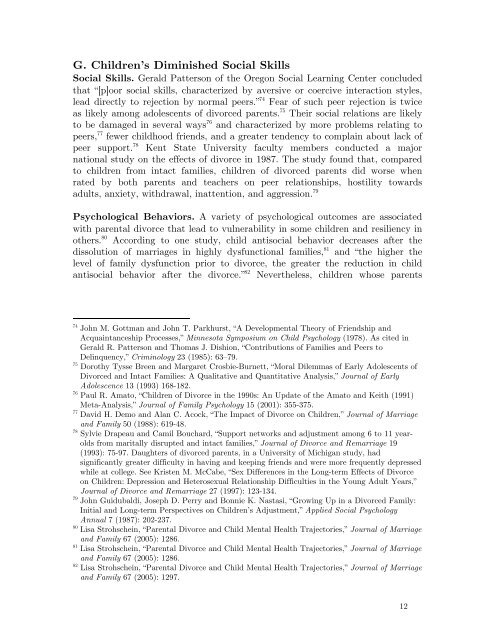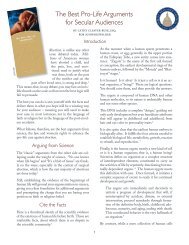The Effects of Divorce on Children - Family Research Council
The Effects of Divorce on Children - Family Research Council
The Effects of Divorce on Children - Family Research Council
You also want an ePaper? Increase the reach of your titles
YUMPU automatically turns print PDFs into web optimized ePapers that Google loves.
G. <strong>Children</strong>’s Diminished Social Skills<br />
Social Skills. Gerald Patters<strong>on</strong> <str<strong>on</strong>g>of</str<strong>on</strong>g> the Oreg<strong>on</strong> Social Learning Center c<strong>on</strong>cluded<br />
that “[p]oor social skills, characterized by aversive or coercive interacti<strong>on</strong> styles,<br />
lead directly to rejecti<strong>on</strong> by normal peers.” 74 Fear <str<strong>on</strong>g>of</str<strong>on</strong>g> such peer rejecti<strong>on</strong> is twice<br />
as likely am<strong>on</strong>g adolescents <str<strong>on</strong>g>of</str<strong>on</strong>g> divorced parents. 75 <str<strong>on</strong>g>The</str<strong>on</strong>g>ir social relati<strong>on</strong>s are likely<br />
to be damaged in several ways 76 and characterized by more problems relating to<br />
peers, 77 fewer childhood friends, and a greater tendency to complain about lack <str<strong>on</strong>g>of</str<strong>on</strong>g><br />
peer support. 78 Kent State University faculty members c<strong>on</strong>ducted a major<br />
nati<strong>on</strong>al study <strong>on</strong> the effects <str<strong>on</strong>g>of</str<strong>on</strong>g> divorce in 1987. <str<strong>on</strong>g>The</str<strong>on</strong>g> study found that, compared<br />
to children from intact families, children <str<strong>on</strong>g>of</str<strong>on</strong>g> divorced parents did worse when<br />
rated by both parents and teachers <strong>on</strong> peer relati<strong>on</strong>ships, hostility towards<br />
adults, anxiety, withdrawal, inattenti<strong>on</strong>, and aggressi<strong>on</strong>. 79<br />
Psychological Behaviors. A variety <str<strong>on</strong>g>of</str<strong>on</strong>g> psychological outcomes are associated<br />
with parental divorce that lead to vulnerability in some children and resiliency in<br />
others. 80 According to <strong>on</strong>e study, child antisocial behavior decreases after the<br />
dissoluti<strong>on</strong> <str<strong>on</strong>g>of</str<strong>on</strong>g> marriages in highly dysfuncti<strong>on</strong>al families, 81 and “the higher the<br />
level <str<strong>on</strong>g>of</str<strong>on</strong>g> family dysfuncti<strong>on</strong> prior to divorce, the greater the reducti<strong>on</strong> in child<br />
antisocial behavior after the divorce.” 82 Nevertheless, children whose parents<br />
74 John M. Gottman and John T. Parkhurst, “A Developmental <str<strong>on</strong>g>The</str<strong>on</strong>g>ory <str<strong>on</strong>g>of</str<strong>on</strong>g> Friendship and<br />
Acquaintanceship Processes,” Minnesota Symposium <strong>on</strong> Child Psychology (1978). As cited in<br />
Gerald R. Patters<strong>on</strong> and Thomas J. Dishi<strong>on</strong>, “C<strong>on</strong>tributi<strong>on</strong>s <str<strong>on</strong>g>of</str<strong>on</strong>g> Families and Peers to<br />
Delinquency,” Criminology 23 (1985): 63–79.<br />
75 Dorothy Tysse Breen and Margaret Crosbie-Burnett, “Moral Dilemmas <str<strong>on</strong>g>of</str<strong>on</strong>g> Early Adolescents <str<strong>on</strong>g>of</str<strong>on</strong>g><br />
<str<strong>on</strong>g>Divorce</str<strong>on</strong>g>d and Intact Families: A Qualitative and Quantitative Analysis,” Journal <str<strong>on</strong>g>of</str<strong>on</strong>g> Early<br />
Adolescence 13 (1993) 168-182.<br />
76 Paul R. Amato, “<strong>Children</strong> <str<strong>on</strong>g>of</str<strong>on</strong>g> <str<strong>on</strong>g>Divorce</str<strong>on</strong>g> in the 1990s: An Update <str<strong>on</strong>g>of</str<strong>on</strong>g> the Amato and Keith (1991)<br />
Meta-Analysis,” Journal <str<strong>on</strong>g>of</str<strong>on</strong>g> <strong>Family</strong> Psychology 15 (2001): 355-375.<br />
77 David H. Demo and Alan C. Acock, “<str<strong>on</strong>g>The</str<strong>on</strong>g> Impact <str<strong>on</strong>g>of</str<strong>on</strong>g> <str<strong>on</strong>g>Divorce</str<strong>on</strong>g> <strong>on</strong> <strong>Children</strong>,” Journal <str<strong>on</strong>g>of</str<strong>on</strong>g> Marriage<br />
and <strong>Family</strong> 50 (1988): 619-48.<br />
78 Sylvie Drapeau and Camil Bouchard, “Support networks and adjustment am<strong>on</strong>g 6 to 11 yearolds<br />
from maritally disrupted and intact families,” Journal <str<strong>on</strong>g>of</str<strong>on</strong>g> <str<strong>on</strong>g>Divorce</str<strong>on</strong>g> and Remarriage 19<br />
(1993): 75-97. Daughters <str<strong>on</strong>g>of</str<strong>on</strong>g> divorced parents, in a University <str<strong>on</strong>g>of</str<strong>on</strong>g> Michigan study, had<br />
significantly greater difficulty in having and keeping friends and were more frequently depressed<br />
while at college. See Kristen M. McCabe, “Sex Differences in the L<strong>on</strong>g-term <str<strong>on</strong>g>Effects</str<strong>on</strong>g> <str<strong>on</strong>g>of</str<strong>on</strong>g> <str<strong>on</strong>g>Divorce</str<strong>on</strong>g><br />
<strong>on</strong> <strong>Children</strong>: Depressi<strong>on</strong> and Heterosexual Relati<strong>on</strong>ship Difficulties in the Young Adult Years,”<br />
Journal <str<strong>on</strong>g>of</str<strong>on</strong>g> <str<strong>on</strong>g>Divorce</str<strong>on</strong>g> and Remarriage 27 (1997): 123-134.<br />
79 John Guidubaldi, Joseph D. Perry and B<strong>on</strong>nie K. Nastasi, “Growing Up in a <str<strong>on</strong>g>Divorce</str<strong>on</strong>g>d <strong>Family</strong>:<br />
Initial and L<strong>on</strong>g-term Perspectives <strong>on</strong> <strong>Children</strong>’s Adjustment,” Applied Social Psychology<br />
Annual 7 (1987): 202-237.<br />
80 Lisa Strohschein, “Parental <str<strong>on</strong>g>Divorce</str<strong>on</strong>g> and Child Mental Health Trajectories,” Journal <str<strong>on</strong>g>of</str<strong>on</strong>g> Marriage<br />
and <strong>Family</strong> 67 (2005): 1286.<br />
81 Lisa Strohschein, “Parental <str<strong>on</strong>g>Divorce</str<strong>on</strong>g> and Child Mental Health Trajectories,” Journal <str<strong>on</strong>g>of</str<strong>on</strong>g> Marriage<br />
and <strong>Family</strong> 67 (2005): 1286.<br />
82 Lisa Strohschein, “Parental <str<strong>on</strong>g>Divorce</str<strong>on</strong>g> and Child Mental Health Trajectories,” Journal <str<strong>on</strong>g>of</str<strong>on</strong>g> Marriage<br />
and <strong>Family</strong> 67 (2005): 1297.<br />
12




